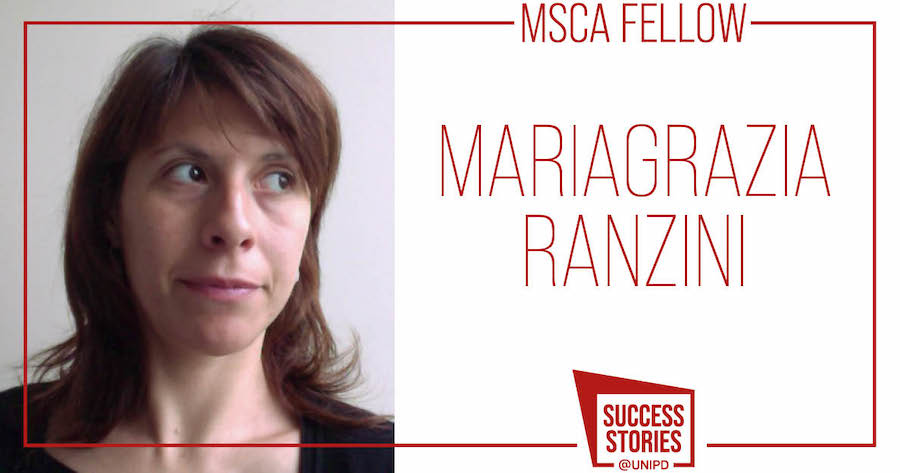
MSCA Fellow: Mariagrazia Ranzini
Why do we count with our hands? Let’s have a look into our brain!

Mariagrazia Ranzini is a MSCA Fellow at the Department of Neuroscience. After a career break, she came back to research thanks to a MSCA Individual Fellowship - Career Restart Panel.
Mariagrazia works on numerical cognition in relation to other aspects of human cognition, such as spatial attention, working memory, hand action, and synaesthesia. Her research is interdisciplinary, and her personal research network includes psychologists, neurologists, physicists, engineers, philosophers.
Can you briefly and simply explain what your MSCA research project is about?
The MSCA-IF project “GRINP” (Grasping and Reaching In Number Processing) concerns the study of the neural underpinnings of number processing. My project builds upon action-based theories of cognition, according to which many aspects of human cognition are rooted on sensorimotor experience. In this project, I couple behavioural, neuropsychological and neuroimaging approaches to reach a comprehensive understanding of the cognitive and neural mechanisms underlying number processing and its impairment following brain damage.
You studied and worked as postdoc in different Universities, both in Italy and in Belgium. What did you learn in those different environments? How did you manage to integrate the different approaches to research?
National and international research experiences are very important for researchers, as they open your mind to new research perspectives and allow creating solid research networks and learning new research techniques. In addition, in my case, working in different environments allowed me to approach the study of numerical cognition from different points of view, and to learn how to expand my research interests in multidisciplinary research environments (e.g., working with psychologists, neurologists, physicists, engineers, philosophers). Sometimes it can be hard to plan and implement a research experience abroad, but in my case it has always been worth it.
The MSCA Individual Fellowship helped you resume your career in research after a break. Can you tell us more about your experience? How did the fellowship help you go back to research?
After five years in Brussels, I had to come back to Italy (my native country) for family needs, and this was followed by a maternity break. Under those circumstances (change of country and maternity), the chances to succeed in obtaining a new research contract were very low. At that time, the MSCA Individual Fellowship Career Restart panel was tailored to my specific needs, and now it is proving to be an excellent opportunity to develop my research in one of the best Italian Universities, learning new research methods and resuming my national and international research networks.
You applied for a MSCA Individual Fellowship first under call 2017, but you were not funded; you then applied in 2018 again and obtained the grant: what made the difference, in your opinion?
Each year the International Research Office of the University of Padua organises the MSCA MaRaThoN, a meeting for candidates who wish to apply for MSCA grants. I attended this event in 2018, and this was crucial to understand why my proposal was not successful, and to understand how to revise it.
Could you tell us how is your project developing with respect to what you had planned?
A large part of my project concerns data collections on healthy adults and brain-damaged patients. Unfortunately, it was not possible to collect data during this first year due to Covid-19 restrictions. Nonetheless, I have found ways to adapt my project to this exceptional pandemic context. Thanks to the collaborations of many experts from the University of Padua I could implement a meta-analytical study using publicly available data. With such a method we were able to highlight the presence of a common brain network underlying number processing and the planning and execution of hand action, allowing to reach my research objectives even in this context of exceptionally limited possibilities. Also, thanks to the contribution of colleagues from Unipd, I am implementing online testing, which allows to collect behavioural data from remote. In my view, the health crisis due to Covid-19 has been positively managed by the University of Padua, which has soon provided means for smart working, support to researchers, and soon after managed the vaccination campaign. That said, I think that this year was particularly hard for those researchers who had, at the same time, to work and to take care of not self-sufficient members of the family during lockdown. I am afraid that the career of the researchers who had to provide exceptional family support during this last year might have been particularly impacted, and this might have created problematic gaps between researchers.
International Research Office
via Martiri della libertà 8, 35137 Padova, Italy
tel. +39 049.827 1947 / 1948 / 1945
fax +39 049.827 1911
international.research@unipd.it


